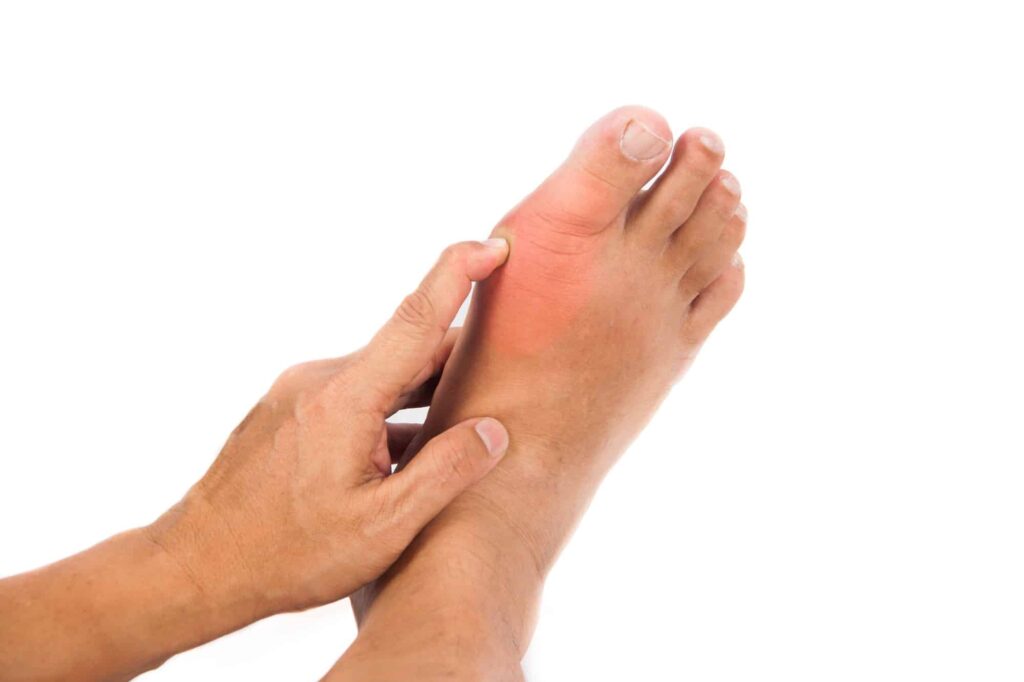Gout Treatment In Nashville
What is Gout?
Are you having any sudden, severe attacks of pain, swelling, redness, warmth in the joints of your foot? So painful that the weight of the bed sheet is intolerable? Waking you up in the middle of the night? But no recent trauma?
You are most likely experiencing an acute gouty attack. Gout occurs when urate crystals accumulate in your joint, causing the inflammation and intense pain of a gout attack. Urate crystals can form when you have high levels of uric acid in your blood.
Gout, also called gouty arthritis, is a type of arthritis marked by excruciating pain, redness, and joint soreness. Inflammation, or swelling of the joints, frequently in the big toe or foot area, is a common sign of gout.
Excess uric acid can crystallize and accumulate in the joints, causing chronic pain and inflammation until gout occurs. Attacks generally happen at night but can be unexpected.

Symptoms of a Gout Attack:
- Excruciating or sharp pain, usually located in joints.
- Redness around the inflamed area.
- Swelling around joints.
- Skin that is warm or hot to the touch.
- Bulging or deformed joints may be a form of severe gout.
High serum urate levels accumulate when the body produces too much or eliminates too little through urine. As a result, you can develop painful arthritis and joint inflammation.
Your body produces uric acid when it breaks down purines — substances that are found naturally in your body. Purines are also found in certain foods, such as steak, organ meats and seafood. Other foods also promote higher levels of uric acid, such as alcoholic beverages, especially beer, and drinks sweetened with fruit sugar (fructose). Normally, uric acid dissolves in your bld and passes through your kidneys into your urine. But sometimes either your body produces too much uric acid or your kidneys excrete too little uric acid. When this happens, uric acid can build up, forming sharp, needlelike urate crystals in a joint or surrounding tissue that cause pain, inflammation and swelling. Call Cutting Edge Foot and Ankle clinic, 615-866-9639 if you are experiencing any of these intolerable symptoms. We will be able to provide you with quick relief and treatment of an extremely painful acute gout attack.
Diagnosis of Gout
Usually, you won’t get a positive diagnosis of gout until you’ve had at least two episodes of acute symptoms.
It’s critical to recognize risk factors and triggers:
- Obesity, especially in males
- High Blood Pressure
- Heart Disease
- Diabetes
- Renal Illness
- Take Prescribed Diuretics
- Alcohol
- Snacks and Beverages that contain Sugar
Foods high in Purines, including organ meats, some shellfish, and red meat
Once your doctor determines the cause of your gout flare-ups and identifies any personal risk factors, they will develop a strategy to help you avoid triggers and treat any underlying medical illnesses that may be affecting your condition.
A needle is used by your doctor to draw fluid from the affected joint. A microscope examination of the fluid will reveal if you have high levels of urate crystals. A blood test can also determine the concentrations of uric acid in your blood. The usual tests for gout are:
- Uric Acid Blood Test
- Joint Aspiration
- X-Rays
- Dual Energy CT Scan
- Ultrasound
- Joints. A gout attack usually starts in the lower extremities, especially the big toe.
- Tendons. High levels of uric acid can form needle-shaped crystals in the membranes that surround tendons.
- Bursae. These are cushion-like sacs that sit in between soft tissues and bones.
- Kidneys. Too much uric acid can induce kidney stones and occasionally cause permanent kidney damage.
You can prevent gout flare-ups with dietary restrictions to cut out triggering foods and beverages, losing excess weight, and implementing other healthy practices. To lessen pain and inflammation during flare-ups, nonsteroidal anti-inflammatory medications (NSAIDs), steroids, and a prescription anti-inflammatory medication may be used.
Call your doctor if you have severe joint discomfort. Untreated gout can result in deteriorating joint damage. If you have a fever and a joint that is hot and inflamed, which could be an infection, seek medical attention at once.
If you suspect you’re developing gout, your doctor will determine what treatments and medications are right for you.
While medical offices are taking safety precautions when patients visit in person, monitoring your health from home is still an option with Telehealth. If you’re suffering from pain, swelling, inflammation, tenderness, or redness in your big toe or other joints, you may be developing gout. With treatment, gout flare-ups and their symptoms can be controlled.
Using Telehealth allows your doctor to diagnose gout, and the possibility of infection or kidney stones.
Telehealth Podiatry in Memphis TN has launched a Telehealth program to give you access to world-class care from the comfort of your own home! With our efficient onboarding system and secure patient portal, it’s easy to see us for all your foot and ankle disease, pain, or wound needs!

